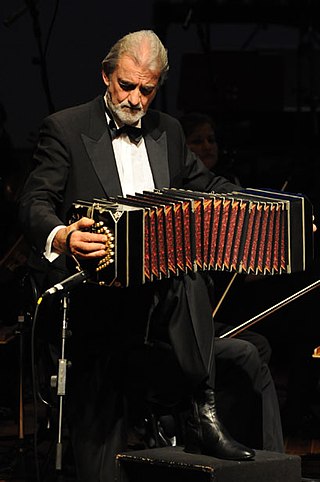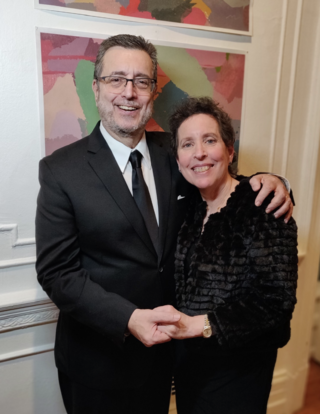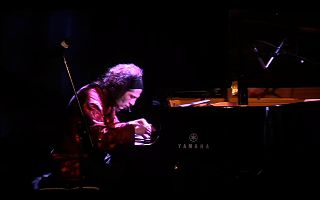
Astor Pantaleón Piazzolla was an Argentine tango composer, bandoneon player, and arranger. His works revolutionized the traditional tango into a new style termed nuevo tango, incorporating elements from jazz and classical music. A virtuoso bandoneonist, he regularly performed his own compositions with a variety of ensembles. In 1992, American music critic Stephen Holden described Piazzolla as "the world's foremost composer of Tango music".

The music of Argentina includes a variety of traditional, classical and popular genres. One of the country's most significant cultural contributions is the tango, which originated in Buenos Aires and its surroundings during the end of the 19th century and underwent profound changes throughout the 20th century. Folk music was particularly popular during the 20th century, experiencing a "boom" in popularity during the 1950s and 1960s thanks to artists such as Atahualpa Yupanqui and Mercedes Sosa, prominent figures of the Nuevo cancionero movement. In the mid-to-late 1960s, the countercultural scene of Buenos Aires originated Argentine rock, considered the earliest incarnation of Spanish-language rock for having an autochthonous identity that differed from that of England or the United States. It was widely embraced by the youth and since then has become part of the country's musical identity as much as traditional music. According to the Harvard Dictionary of Music, Argentina also "has one of the richest art music traditions and perhaps the most active contemporary musical life.

Tango is a partner dance and social dance that originated in the 1880s along the Río de la Plata, the natural border between Argentina and Uruguay. The tango was born in the impoverished port areas of these countries from a combination of Rioplatense Candombe celebrations, Spanish-Cuban Habanera, and Argentine Milonga. It was frequently practiced in the brothels and bars of ports, where business owners employed bands to entertain their patrons. It then spread to the rest of the world. Many variations of this dance currently exist around the world.

Milonga is a musical genre that originated in the Río de la Plata areas of Argentina, Uruguay, and the Brazilian state of Rio Grande do Sul. It is considered a precursor of the tango.
Chilean music refers to all kinds of music developed in Chile, or by Chileans in other countries, from the arrival of the Spanish conquistadors to the modern day. It also includes the native pre-Columbian music from what is today Chilean territory.

Tango is a style of music in 2
4 or 4
4 time that originated among European and African immigrant populations of Argentina and Uruguay. It is traditionally played on a solo guitar, guitar duo, or an ensemble, known as the orquesta típica, which includes at least two violins, flute, piano, double bass, and at least two bandoneóns. Sometimes guitars and a clarinet join the ensemble. Tango may be purely instrumental or may include a vocalist. Tango music and dance have become popular throughout the world.
Chilean rock is rock music and its corresponding subgenres produced in Chile or by Chileans. Chilean rock lyrics are usually sung in Spanish so can be considered as part of rock en español, although sometimes are sung in English as well.

Ernesto Acher is an Argentine comedian, actor, composer, arranger, multi-instrumentalist and orchestral conductor. Between 1971 and 1986 he was a member of the celebrated Argentine group Les Luthiers, with which he acted as composer, comedian, singer, and performer on more than twenty instruments, some of which he created himself. Before separating from the group, he was involved in individual projects as composer – including a soundtrack, a quartet for clarinet and strings, a string sextet and a symphonic poem for viola and orchestra. In 1988 he founded the La Banda Elástica (The Elastic Band), gathering some of the most outstanding Argentine jazz musicians. The band dissolved in 1993. Since then he has developed several musical and comedy projects, and performed as an orchestral conductor.

Rodolfo Mederos is an Argentine bandoneonist, composer and arranger. He lived in Cuba and France; in Argentina, he founded the experimental group Generación Cero.

Pablo Ziegler is a Grammy Awards winning Argentine composer, pianist, arranger based in New York City. He is an exponent of nuevo tango, and has worked extensively as Ástor Piazzolla's regular pianist from 1978 until Piazzolla's retirement for health reasons in 1989. During their collaboration, they performed with Milva, Placido Domingo, Gary Burton among others. He played with Piazzolla's re-formed Conjunto 9 in 1983 for his Teatro Colón concert with the Buenos Aires Philharmonic. In 1985 Ziegler composed the music for the film Adios Roberto, and in 1990, he established the New Tango Quartet.

Carlos Alberto Franzetti is a composer and arranger from Buenos Aires, Argentina.

Fernando Otero is a Grammy-award-winning Argentine pianist, vocalist, and composer.

Mariano Alberto Martínez, known professionally as Mariano Mores, was an Argentine tango composer and pianist.

Xavier Moyano is an Argentine musician; producer, performer, composer, and educator. He began his career as a session guitarist in Tucuman in 1999. By 2003 was the guitarist for rock/pop band "AVe Cesar" until 2008, after that he became a solo rock instrumentalist. Between 2009 and 2011 he was guitarist and composer of metal band "Seliger" (Argentina/Brasil), between 2014 and 2019 he was guitarist and producer of "Cossas Novas", since 2018 he is guitarist and co-producer of "Rock Bro's" (ClassicRock). He is currently a solo guitarist, session musician and producer.
Fernando Egozcue is an Argentinian guitarist and composer.
Perrosky is a Chilean band formed by the brothers Alejandro and Álvaro Gómez, originally from the city of Copiapó, Chile. Their influences include rock and roll, folk and blues.
Chilean electronic music refers to the electronic music genre and its subgenres produced in Chile or by Chileans.

Nano Stern is a Chilean singer, multi-instrumentalist and composer of the "third generation of Chilean singer-songwriters" who appear after the 1990s. His work is linked with popular song movements and his style encompasses trova, fusion, folk and rock.

Gabriel Palatchi is an Argentinian pianist, music composer, and musical arranger who blends genres that include Latin Jazz, Tango, Funk, and Klezmer.
Pablo Murgier is a pianist, arranger and composer from Argentina based in Paris, France. He is best known for his project the Pablo Murgier Ensemble, which was awarded the first World Tango Orchestra Award as part of the Tango International Meeting for Musicians at the CCK in Buenos Aires, and its first album was nominated to the Premios Gardel in the Best New Artist category.














